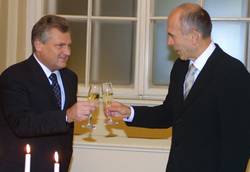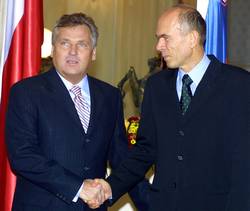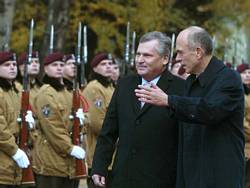 Office of the President of the Republic > Press centre
Office of the President of the Republic > Press centre
Poland and Slovenia have similar views on the European Constitution, too
Ljubljana, 11/13/2003 | statement

Today and tomorrow, at the invitation of the President of the Republic of Slovenia, Dr Janez Drnovšek, the President of the Republic of Poland, Aleksander Kwasniewski, together with a delegation, is paying an official visit to Slovenia. During their formal talks, the two presidents were of the opinion that bilateral relations between the countries are very good. In this connection, the Slovene President mentioned that Poland is an important partner to Slovenia in political, economic, cultural and other domains, and expressed his belief that the friendly relations between the countries will become even stronger. The two sides exchanged opinions on the work of the Intergovernmental Conference and presented their views on the draft Constitution of the European Union. The Polish President is accompanied by a large business delegation, which is also taking part in a Business Forum of Slovene and Polish entrepreneurs at Gospodarsko rastavisce (Ljubljana Fairground). President Drnovšek gave the following statement on relations between the countries (unauthorised transcription):
 Dr Janez Drnovšek: I am very pleased with today’s visit. The President of Poland, Aleksander Kwasniewski, is a good friend of mine and we have met on many occasions. In addition, relations between the countries are very friendly. They are being developed in all areas. We note that trade is increasing, that investments are in progress and that our companies are interested in investing in Poland, which means that this simultaneous visit of the Polish business delegation to Slovenia is important for identifying new possibilities of economic cooperation. Good relations exist in other fields, too, such as culture. In terms of politics, it is not surprising that Slovenia and Poland have such similar goals and similar positions concerning important issues, or Europe, security, as well as the preparation of the new European Constitution, so that we often harmonise these views and help each other with their implementation. I am convinced that today’s visit of Mr Kwasniewski will further enhance our relations. We also anticipate close cooperation within the EU and NATO, which will start in May of next year.
Dr Janez Drnovšek: I am very pleased with today’s visit. The President of Poland, Aleksander Kwasniewski, is a good friend of mine and we have met on many occasions. In addition, relations between the countries are very friendly. They are being developed in all areas. We note that trade is increasing, that investments are in progress and that our companies are interested in investing in Poland, which means that this simultaneous visit of the Polish business delegation to Slovenia is important for identifying new possibilities of economic cooperation. Good relations exist in other fields, too, such as culture. In terms of politics, it is not surprising that Slovenia and Poland have such similar goals and similar positions concerning important issues, or Europe, security, as well as the preparation of the new European Constitution, so that we often harmonise these views and help each other with their implementation. I am convinced that today’s visit of Mr Kwasniewski will further enhance our relations. We also anticipate close cooperation within the EU and NATO, which will start in May of next year.
Question: Where do your positions on the future EU differ and where do they coincide?
 Dr Drnovšek: Our positions are fairly identical. With reference to the voting system within the new European Constitution, Slovenia would prefer the solutions that were adopted at the EU summit in Nice. We should also like to clarify relations under the new European Constitution between the proposed president and minister of foreign affairs, and the Commission and the Council. Slovenia has proposed, and we have heard that Poland agrees with this, that a collective presidency be introduced for various committees in the Council of Ministers, allowing rotation. However, above all we wish a positive agreement to be reached as soon as possible. In this respect, I expect that Poland will have, I won’t say difficulties, but more intense negotiations in the final phase, because in the case of Poland there is a greater difference between what was agreed in Nice and what is proposed in the draft European constitutional treaty, than in the case of Slovenia.
Dr Drnovšek: Our positions are fairly identical. With reference to the voting system within the new European Constitution, Slovenia would prefer the solutions that were adopted at the EU summit in Nice. We should also like to clarify relations under the new European Constitution between the proposed president and minister of foreign affairs, and the Commission and the Council. Slovenia has proposed, and we have heard that Poland agrees with this, that a collective presidency be introduced for various committees in the Council of Ministers, allowing rotation. However, above all we wish a positive agreement to be reached as soon as possible. In this respect, I expect that Poland will have, I won’t say difficulties, but more intense negotiations in the final phase, because in the case of Poland there is a greater difference between what was agreed in Nice and what is proposed in the draft European constitutional treaty, than in the case of Slovenia.
Question: May I inquire about your view on the common European defence policy, and whether Polish and Slovenian positions in this respect are identical?
 Dr Drnovšek: Even regarding this issue they are very similar. We are definitely in favour of a common European defence. In the light of the many security challenges in the world, Europe will have to do more for its own defence, there is no doubt about this. On the other hand, we wish the NATO alliance and the partnership with the USA to remain, since this is an important element of stability for the world. A common European defence yes, but not in competition with the USA but only as its complement and also to provide the possibility of Europe intervening on its own when this is in its interest, and particularly when Europe is in question. Europe still has possible crisis points and it is important that Europe can be self reliant in such cases, so that it can respond rapidly and that NATO’s intervention can be avoided, given that it is only to be expected that the USA may have different priorities within a specific time frame than Europe.
Dr Drnovšek: Even regarding this issue they are very similar. We are definitely in favour of a common European defence. In the light of the many security challenges in the world, Europe will have to do more for its own defence, there is no doubt about this. On the other hand, we wish the NATO alliance and the partnership with the USA to remain, since this is an important element of stability for the world. A common European defence yes, but not in competition with the USA but only as its complement and also to provide the possibility of Europe intervening on its own when this is in its interest, and particularly when Europe is in question. Europe still has possible crisis points and it is important that Europe can be self reliant in such cases, so that it can respond rapidly and that NATO’s intervention can be avoided, given that it is only to be expected that the USA may have different priorities within a specific time frame than Europe.
Question: Are you interested in investments in both countries?
Dr Drnovšek: Of course, Slovene companies have already been investing in Poland and we expect Polish companies to invest in Slovenia. The rules of the game, if I may say so, will become uniform with accession to the EU and it can be expected that Polish companies will be able to emerge without obstacles in Slovenia and on the Slovenian market, and certainly also as investors.
Question: What is your comment on the statements of the Croatian foreign minister that the Croatian government will initiate arbitration proceedings in relation to the border with Slovenia at its session today?
Dr Drnovšek: Within the last 12 years, we have already often discussed the issue of arbitration with Croatia. In the same period, I have personally discussed this issue with at least five Croatian prime ministers and we were frequently quite close to discussing arbitration. At the beginning of 2001, I discussed this subject with Croatian Prime Minister Račan, too, and at that time I was convinced that due to the very sensitive political nature of this issue, and the possible political difficulties that could emerge in relation to it, we could have recourse to arbitration. At that time, though, Prime Minister Račan was more optimistic and thought that everything could be resolved by bilateral agreement. We would certainly have preferred it that way and we actually did achieve a bilateral agreement which, unfortunately, the Croatian government did not subsequently honour. From that point on, all bilateral initiatives, in which we did all that was possible bilaterally, including arbitration initiatives, have stood still. An arbitration agreement is not that simple, either, and this too will have to be agreed. I remember that two years ago, when Croatian Prime Minister Račan could not proceed on the agreement we had adopted earlier, he was very sceptical about whether the then Croatian government could agree on arbitration. We will see what happens in the future, particularly after the Croatian elections, because it seems to me that all similar initiatives have come up two weeks before the elections and we should also view it in this context.